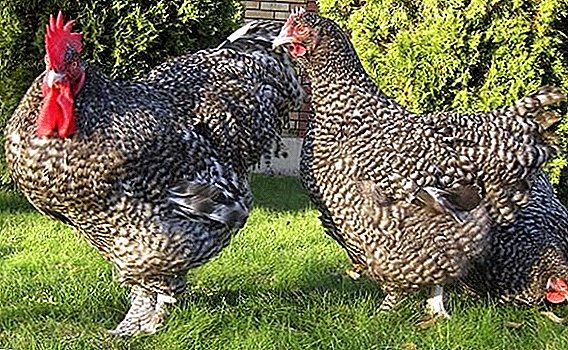 Immediately after calving, the farmer has another difficult task: to provide the newborn calf with proper care and to establish the correct diet. As a rule, a month after giving birth, the baby is fed various useful supplements into the diet, including an emphasis on a product such as raw eggs.
Immediately after calving, the farmer has another difficult task: to provide the newborn calf with proper care and to establish the correct diet. As a rule, a month after giving birth, the baby is fed various useful supplements into the diet, including an emphasis on a product such as raw eggs.
Is it possible to give raw eggs to calves
Today, many modern and balanced feeds dominate in livestock markets, allowing you not to manually prepare mixtures of different products.  However, experienced farmers in the old-fashioned way recommend including an egg in a veal supplement, which has a mass of irreplaceable, beneficial substances:
However, experienced farmers in the old-fashioned way recommend including an egg in a veal supplement, which has a mass of irreplaceable, beneficial substances:
- vitamins A, E, group B;
- lysozyme;
- minerals;
- lecithin;
- amino acids;
- iron;
- selenium.
Did you know? Adult cows and calves are very sensitive creatures, they are very worried when a member of their herd dies. A cow may cry for several hours if a calf is taken away from it, and a calf, when not paying enough attention, can become harassing and become very sick.
The beneficial effect of the raw product on the body of the calf:
- forms a healthy pelt and shiny wool;
- strengthens the cardiovascular system and joints;
- helps to form a healthy bone system.

Feeding rules
Observance of certain rules in the nutrition of young stock will contribute to the proper development of its immunity. In the general system of rationing for young cattle, there are three main periods:
- Colostrum - duration 20-30 days;
- Milk - up to 4-5 months of life;
- Postmilk - up to 18 months of age.
Important! Separately, it is necessary to highlight the benefits of eggshell, specially ground into powder. The use of the resulting mass at least three times in 2-3 months in the future will provide the calf with strong teeth and bones.
During the dairy and post-dairy periods, in a daily ration include not only raw eggs, but also other nutritious foods:
- concentrated feed - 100-120 g, from 7-10 days of life;
- crushed and carefully sifted grain (oatmeal);
- compound starter;
- high-quality, leafy legume-cereal hay - 150-200 g from 14 days of age;
- juicy feed, silage - 100-150 g from one month of age.
 Raw eggs, meat and bone meal, and table salt are used as nutritious and vitamin-mineral supplements.
Raw eggs, meat and bone meal, and table salt are used as nutritious and vitamin-mineral supplements.From what age can
Typically, the input of raw eggs in the calf's menu occurs a month after birth. However, sometimes a cow is not able to provide its offspring with colostrum, then the raw product begins to be used literally in the first hours as an important component in the preparation of artificial colostrum.
Find out what vitamins calves need for rapid growth.
How to give
An approximate recipe for artificial colostrum looks like this: add 15 ml of fortified fish oil, 7 g of table salt, 3 fresh raw chicken eggs to 1 l of fresh milk from a fresh cow and mix thoroughly until smooth (use a blender). Immediately after birth, the calf should be fed no more than 1 liter.  During subsequent feedings, the emulsion is diluted by half with warm boiled water and evaporated in batches - 5-8 times per day for 1.3-2 l of colostrum. You can use raw eggs as an additional source of vitamin-mineral substances according to this scheme: add 2-3 pieces to mixed feed 3-5 times a month.
During subsequent feedings, the emulsion is diluted by half with warm boiled water and evaporated in batches - 5-8 times per day for 1.3-2 l of colostrum. You can use raw eggs as an additional source of vitamin-mineral substances according to this scheme: add 2-3 pieces to mixed feed 3-5 times a month.
Contraindications and harm
The main danger in eating raw eggs is the risk of salmonellosis. When injected into the calf's weak body, the bacteria cause pronounced symptoms:
- nausea, vomiting;
- severe pain in the stomach;
- increase in body temperature over 41 ° C;
- fall to his feet.
Important! For any manifestations of the disease should immediately contact a veterinarian. Only a specialist will be able to professionally inspect the animal, make the necessary tests and prescribe treatment.Microorganisms can cause severe and irreversible consequences in the form of underdevelopment of young animals and even death. To avoid salmonella damage, you should buy high-quality eggs only in trusted stores and farms. Also, when uncontrolled eating or idiosyncrasy, the chicken product can cause calf allergy.
 The severity of an allergic reaction can be traced by the following signs:
The severity of an allergic reaction can be traced by the following signs:- large blistering spots appeared on the animal's skin;
- the wool stood on end;
- neck and chest noticeably swollen;
- weighted breathing appeared;
- palpitations increased.
Did you know? Calves are able to memorize their name and continue to respond to it, just like dogs. Also, babies always strive to lick the person they like.Despite the indisputable beneficial effects of raw eggs on the body of calves, these products should be introduced into the diet carefully and gradually. As a result, a conscientious farmer will grow up healthy and strong young, which in the future will be pleased with high productivity.












